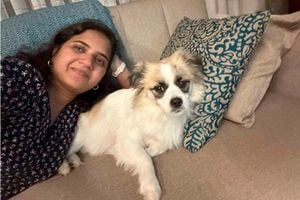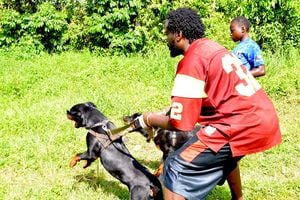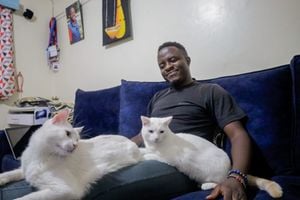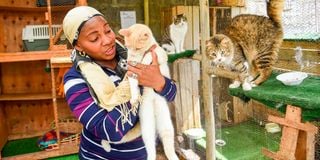
Lina Sonia with some of the special need cats at her home in Ngong’ on October 2, 2024.
When we arrive at Lina Sonia's home, we are greeted by her calm presence, but her overly-excited dogs capture our attention. There is Maggie, her two-legged dog, who Lina warns may get so excited that she might accidentally pee on someone.
Inside the house, Grace, her first-ever special needs pet, welcomes us, wearing a little red sweater.
At first glance, everything seems normal with Grace; she's friendly, happy to see visitors, and will even sit by your leg. However, when you try to pick her up, you realise all is not well. Grace recoils and lets out a scream.
“Grace had been locked up for four years before I found her in 2016. She had no socialisation. She had anxiety; she was always scared of people, scared of her own shadow. What she has is post-traumatic stress disorder for animals. When I got her, she would sit in one corner and she would drink her own urine. There was water there, but she did not know what water was. She would pick her food from the plate and put it on the floor. Sometimes, she would wake up in the middle of the night screaming,” Lina says of her now 11-year-old Grace.
As for Maggie, she was born with two legs.
“Her back legs just didn't form properly. It is not painful for her, and she doesn't want to use wheels either. I tried but she refused, so she hops around like a kangaroo and is one of the fastest dogs that we have here,” the founder of Pawsitive Pet Care Kenya says.
Lina is dedicated to taking care of special needs animals.

Lina Sonia with her dog Sethaniol at her home in Ngong on October 2, 2024.
When did her love for animals begin? “Right from childhood,” Lina recalls.
“I come from a long line of animal lovers. My mom's pet was an ostrich, my great-grandmother had a gorilla, and another relative had a hippopotamus. The first pet I was given to care for was a tortoise we named Sunday. My grandfather was also an animal lover and kept rescuing dogs, so we always had pets around. Everyone had a role in taking care of them, and I loved it. Also, I didn't have many friends growing up, so I found companionship in animals. That bond has only deepened with time.”
Born and raised in Kenya, Lina moved to Nigeria after high school, where she began rescuing dogs and putting them up for adoption. However, she didn't encounter her first special needs pet until she returned to Kenya in 2016 while volunteering at the Kenya Society for the Protection and Care of Animals (KSPCA).
"It was then that my purpose started forming,” she says.
“I always knew I wanted to work with animals, but I wasn't sure how. I realised that many special needs animals were abandoned because people didn't know how to care for them,” she says, adding, “There are those born with defects, others were born normal, mistreated, and then developed a problem. I decided to take in a special-needs animal and see how it would go. Then Grace found me.”
The first thing she did was to read about how to raise a mentally challenged pet. Then, just as she had gotten a hang of things with Grace, Luna, her blind and deaf cat, came calling in 2019.

Maggie and Ghosty in their kennel at Lina Sonia’s home in Ngong on October 2, 2024.
“She had been hit in the head with a blunt object to a point where her eyes had popped out. The vets at KSPCA pushed her eyes back in, but she had lost her sight already, and her hearing was partially gone, too. I was touched, and I decided to keep her. I told myself, 'I read about Grace and she is still alive and kicking so I can read some more.' So, I read about how to live with a deaf and blind cat. I named her Luna because her eyes were there, but she could not see anything. She is now a fat baby girl, living in my bedroom. Because of her blindness and partially deaf situation, we try not to move her around much,” Lina explains.
Since then, Lina has taken in numerous special needs pets. There's Ghosty and Sethaniol, her other mentally challenged dogs. Her special needs cats include Snowy, who has faecal incontinence and lives in the pantry, and Nugget and Mr Wiggles, who were born with Cerebellar Hypoplasia (a condition similar to cerebral palsy in humans).
Other animals include Casper and Chausiku, who are gradually going blind, and Ginger, a paraplegic cat who can't express faeces or urine independently.
“Ginger needs regular exercise since he drags himself around,” Lina explains, "I'm hoping to get a kiddy pool and some wheels for him to help him move around.”
In total, Lina cares for 35 special needs cats, six dogs, and Tito, a three-legged tortoise.
“I've realised that all these animals need is love. It doesn't matter if they were born with a defect or if someone caused it. They just need someone to believe in them and love them,” Lina says, adding that none of her pets have ever harmed her except for the occasional and normal scratching by the cats, hence the need to put on long-sleeved clothes.
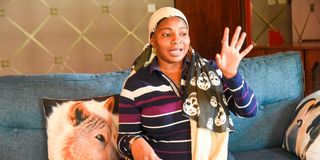
Lina Sonia during an interview at her home in Ngong’ on October 2, 2024.
She adopts the special needs pets from KSPCA and the larger animal community.
“When there is a deformed cat or dog, I give my opinion and sometimes people bring them to me. When they come in, I put them in isolation for the first two weeks where I check for any signs of sickness or fleas, and to get her to trust us, get her to know that she is in a safe space. Then I take the pet to a vet to get her dewormed, vaccinated and deflead then I can mix them with the rest of the animals.”
Caring for special needs pets is not without its challenges. Lina spends between Sh120,000 and Sh150,000 a month on food.
"I have been fortunate that there are pet shops that often give me donations, but when they don't have any pet food to donate, I must buy it. Every month I buy around 100 kilograms of rice and 60 kilograms of meat. For veterinary services, I have been blessed to have extremely amazing friends who are vets and they help me with some of the most complex of cases. KSPCA also helps a lot with the preliminary checks of the animals,” she says.
For Lina, her biggest sacrifice has been forgoing family time as she cares for her pets.
“I am a family-oriented person, and I would love to travel every year to go see my dad in Nigeria, but I look at the ticket fare, and I remember that my pets have not eaten, and I forget about that trip,” she says, adding that travelling for a long time is also not an easy decision for her to make.

Grace at Lina Sonia’s home in Ngong on October 2, 2024.
“The last time I travelled for a long time, I had to carry two of my pets, and we had to do a whole month of planning for that travel. I had my sister-in-law come and stay at my house for a week before the travel. I had to write sticky notes and print a whole PowerPoint presentation of how the pets are to be taken care of. Even then I was still a helicopter mom (overparenting) so I kept calling her every day to confirm if they were still okay and alive,” she says.
Her biggest support system has been her husband, who has also picked up on her hobby.
“My husband is like a super dad, so when I am not there, he really steps up. We have cats that need a diaper change as they cannot pee on their own, and he takes over,” she says.
Her other sacrifice has been sleep, with her day starting at 4am and ending at 11pm.
"My day starts at 4am when I wake up, and as my husband warms up the pet food, I go out to check up on the animals and do the first cleaning of their homes. Their houses are cleaned at certain times a day. The first cleaning in the morning allows me to check up on the pets to confirm if all is well. During the day, I have trained my three employees on how to care for them, so they handle things while I work. Then, in the evening, after they leave, my shift starts again. I spend some time with the animals, and then by 7pm, they all calm down. At 11pm, I do the final check, and then it is lights out for me,” Lina, who works remotely, says.

Snowy at Lina Sonia’s home in Ngong on October 2nd 2024. Billy Ogada | Nation
The pets are fed twice daily, at 6am and 2pm. All her special needs pets are neutered.
“I take them in to give them a fulfilling life. If I allowed them to breed, they would overpopulate, which would go against the goal of giving them quality lives,” she says.
Even with all the sacrifices made, Lina has no regrets.
“Despite giving up a whole lot, I know that everybody is born with a purpose, and taking care of special needs pets is my purpose. Nothing makes me happier than seeing these animals jumping and playing with a full tummy. I thank God that I discovered my purpose on earth, and I am living the life I was created to live.”
Her biggest challenge is finding funds to continue caring for the animals.
“I need to expand my catteries and kennels to accommodate more pets, but I'm financially strained. I can’t say no to new animals because they’ll likely die if I don’t take them in,” she says.

